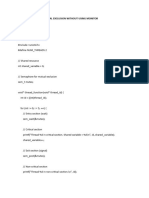0% found this document useful (0 votes)
16 views20 pagesOs Program
The document contains multiple C programs that implement different CPU scheduling algorithms: Round Robin, Shortest Job First (SJF), First-Come First-Served (FCFS), and Priority Scheduling. Each program prompts the user for the number of processes and their burst times, calculates waiting and turnaround times, and displays the results along with average times. Additionally, it includes file allocation methods such as Sequential, Indexed, and Linked allocation with corresponding code implementations.
Uploaded by
asmwcbcacertificateCopyright
© © All Rights Reserved
We take content rights seriously. If you suspect this is your content, claim it here.
Available Formats
Download as PDF, TXT or read online on Scribd
0% found this document useful (0 votes)
16 views20 pagesOs Program
The document contains multiple C programs that implement different CPU scheduling algorithms: Round Robin, Shortest Job First (SJF), First-Come First-Served (FCFS), and Priority Scheduling. Each program prompts the user for the number of processes and their burst times, calculates waiting and turnaround times, and displays the results along with average times. Additionally, it includes file allocation methods such as Sequential, Indexed, and Linked allocation with corresponding code implementations.
Uploaded by
asmwcbcacertificateCopyright
© © All Rights Reserved
We take content rights seriously. If you suspect this is your content, claim it here.
Available Formats
Download as PDF, TXT or read online on Scribd
/ 20






















































































